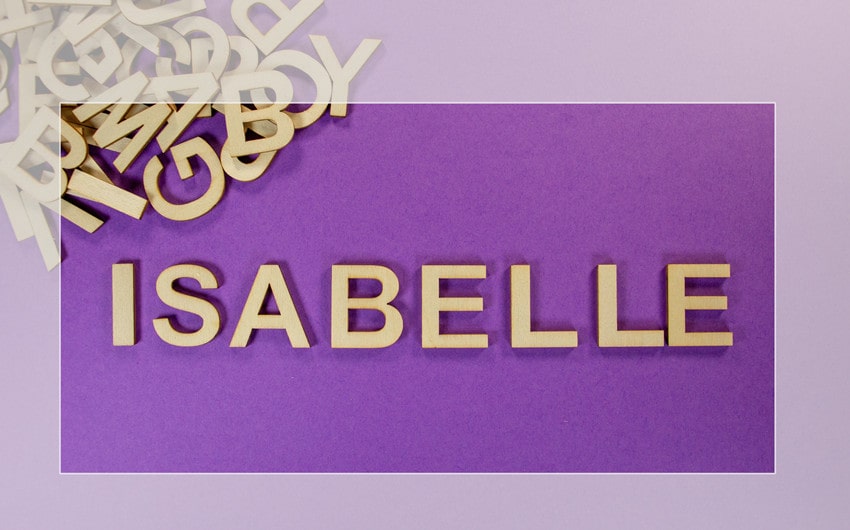Uncovering the Timeless Isabelle Name Meaning and Its History
The name Isabelle has captured hearts for generations with its timeless elegance and rich history. If you’re curious about the Isabelle name meaning, you’re not alone. This beautiful name carries a deep significance that resonates with people across cultures.
Whether you’re considering it for your child or simply love exploring the stories behind names, understanding the meaning of Isabelle adds a layer of appreciation to this classic choice. Let’s dive into what makes Isabelle such a beloved and meaningful name.
Origin, Etymology, and Meaning of Isabelle

Historical Background
The name Isabelle has a rich history, deeply rooted in religious and cultural traditions. Isabelle has been a cherished name across various cultures for centuries. The name first gained prominence in medieval Europe, particularly among French royalty and nobility, which helped spread its popularity throughout the continent. Its elegant and timeless appeal has made it a favorite choice for parents across generations.
Etymology and Development
The etymology of Isabelle traces back to the Hebrew name Elisheba, combining “El” (God) and “sheba” (oath). This linguistic origin reflects a strong spiritual connection, emphasizing a promise or bond with the divine. As the name traveled through different cultures and languages.
In medieval Latin, the name appeared as “Elisabeth,” which influenced its subsequent adaptations. The French version, Isabelle, became particularly popular and has remained a classic name choice, known for its beauty and grace. Despite its various forms, the core meaning of the name has remained intact, symbolizing faith, commitment, and a sacred promise.
Symbolic and Spiritual Significance
The name Isabelle not only carries the literal meaning of “God is my oath” but also embodies deeper symbolic and spiritual connotations. It is associated with qualities such as purity, grace, and devotion, traits often attributed to historical and religious figures who bore the name. In Christian traditions, Isabelle is sometimes linked to the Virgin Mary, known for her purity and devotion, further enhancing the name’s spiritual significance.
Isabelle also symbolizes divine protection and guidance, reflecting the idea of living under a moral and spiritual compass. The name’s connection to faith and elegance has made it a popular choice in literature and art, where characters named Isabelle often embody these qualities. This combination of spiritual depth and aesthetic appeal ensures that Isabelle remains a timeless and meaningful name, beloved by many.
Variations of Isabelle
The name Isabelle, with its rich historical and cultural significance, has inspired numerous variations across different languages and regions. These variations, while retaining the core essence of the name, reflect the unique linguistic and cultural influences of the regions where they are used. Below are some of the most notable variations of the name Isabelle, each carrying its distinct charm and heritage.
1. Isabel
- Language/Culture: Spanish, Portuguese
- Details: Isabel is perhaps the most widely recognized variation of Isabelle. It is particularly popular in Spanish and Portuguese-speaking countries, where it has long been associated with royalty and nobility. The name Isabel has a simpler, more streamlined form compared to Isabelle, yet it retains the same meaning of “God is my oath.” It is a timeless choice, favored for its elegance and historical resonance.
2. Isabella
- Language/Culture: Italian, English
- Details: Isabella is a slightly more embellished version of Isabelle, popular in Italian-speaking regions and English-speaking countries. This variation has been widely used in literature, including the famous character Isabella in Shakespeare’s play “Measure for Measure.” The name Isabella carries a sense of regal sophistication, making it a popular choice among parents seeking a name that is both classic and feminine.
3. Isobel
- Language/Culture: Scottish
- Details: Isobel is the Scottish variation of Isabelle, characterized by its distinctive spelling. This version is particularly popular in Scotland, where it has been embraced for its traditional and elegant appeal. Isobel is often seen as a more straightforward and less ornate variation, yet it carries the same deep meaning and historical significance as Isabelle.
4. Ysabel
- Language/Culture: Spanish, Historical Usage
- Details: Ysabel is an older, more archaic form of Isabel, used in historical contexts, particularly in medieval Spain. This variation reflects the linguistic evolution of the name over time, with the “Y” spelling being common in older Spanish texts. Although less common today, Ysabel still holds historical significance and is occasionally used by those looking to connect with their heritage.
5. Elisabet
- Language/Culture: Nordic, Eastern European
- Details: Elisabet is a variation of Isabelle that is commonly found in Nordic countries like Sweden and Finland, as well as in Eastern Europe. This variation closely resembles the original Hebrew form Elisheba and is often associated with a strong religious or biblical connection. Elisabet is a name that conveys tradition and a deep sense of faith, making it a meaningful choice in these regions.
6. Isabela
- Language/Culture: Portuguese, Romanian
- Details: Isabela, used in Portuguese-speaking countries like Brazil and in Romania, is a streamlined variation of Isabella. It retains the same elegance and grace as the other forms but with a slightly different spelling that reflects the phonetic preferences of these languages. Isabela is often chosen for its simplicity and cultural resonance, making it a popular alternative to the more elaborate Isabella.
7. Isabell
- Language/Culture: German, Scandinavian
- Details: Isabell is a variation commonly found in Germany and Scandinavian countries. This version drops the final “e,” giving it a slightly more modern and minimalist appearance. Despite its simpler form, Isabell retains the same historical and cultural significance as Isabelle, making it a popular choice in these regions.
8. Elisaveta
- Language/Culture: Russian, Bulgarian, Serbian
- Details: Elisaveta is the Slavic variation of Isabelle, commonly used in Russia, Bulgaria, and Serbia. This form emphasizes the name’s biblical roots and is often associated with Eastern Orthodox Christian traditions. Elisaveta carries a sense of formality and grandeur, often used in royal and aristocratic contexts in these countries.
9. Jezebel
- Language/Culture: Hebrew, Historical Usage
- Details: While not a direct variation, Jezebel shares linguistic roots with Isabelle, both deriving from Hebrew origins. However, Jezebel has a different historical connotation, often associated with a figure in the Bible known for her negative reputation. Despite this, Jezebel is occasionally used as a variation of Isabelle in certain contexts, particularly in historical literature.
10. Sabella
- Language/Culture: Latin, English
- Details: Sabella is a shortened and less common variation of Isabella, found in both Latin and English contexts. This form is rare but carries a unique charm, offering a more modern twist on the traditional name. Sabella is often chosen for its simplicity and the elegance it shares with its more popular counterparts.
11. Sabela
- Language/Culture: Galician (Spain)
- Details: Sabela is the Galician version of Isabel, used primarily in the Galicia region of Spain. It reflects the distinct linguistic characteristics of the Galician language, which is closely related to Portuguese. Sabela is a name that connects with the local culture and traditions, making it a popular choice in this region.
Popularity of the Name Isabelle

The popularity of Isabelle has fluctuated over time, with various peaks corresponding to cultural and historical influences. The name has seen several surges in popularity, often influenced by prominent figures in royalty, literature, and popular culture.
Medieval and Renaissance Periods: Isabelle gained significant traction during the medieval and Renaissance periods, especially in France, Spain, and Portugal. Its association with queens, such as Isabella of Castile, played a crucial role in cementing the name’s royal and noble connotations. During these eras, the name was often passed down through aristocratic families, further enhancing its prestige.
20th Century Revival: In the 20th century, Isabelle experienced a revival, particularly in Western Europe and North America. The resurgence of interest in traditional and biblical names contributed to this trend. Isabelle’s elegant sound and historical depth made it a favored choice among parents looking for a name with both beauty and substance.
Early 2000s Boom: The early 2000s marked a significant peak in the popularity of Isabelle, especially in English-speaking countries. The success of the “Twilight” series, where the main character is named Isabella, brought widespread attention to the name and its variants. While Isabella saw the most dramatic increase, Isabelle also benefited from this trend, rising in popularity across various regions.
Current Popularity: Today, Isabelle remains a popular choice, though it has stabilized in rankings after the early 2000s boom. It continues to be favored by parents who appreciate its classic charm and timeless appeal. The name is still frequently found in the top 100 lists in countries like the United States, the United Kingdom, and France. Its popularity is sustained by its versatility, with variations like Isabella and Isabel also maintaining strong rankings.







